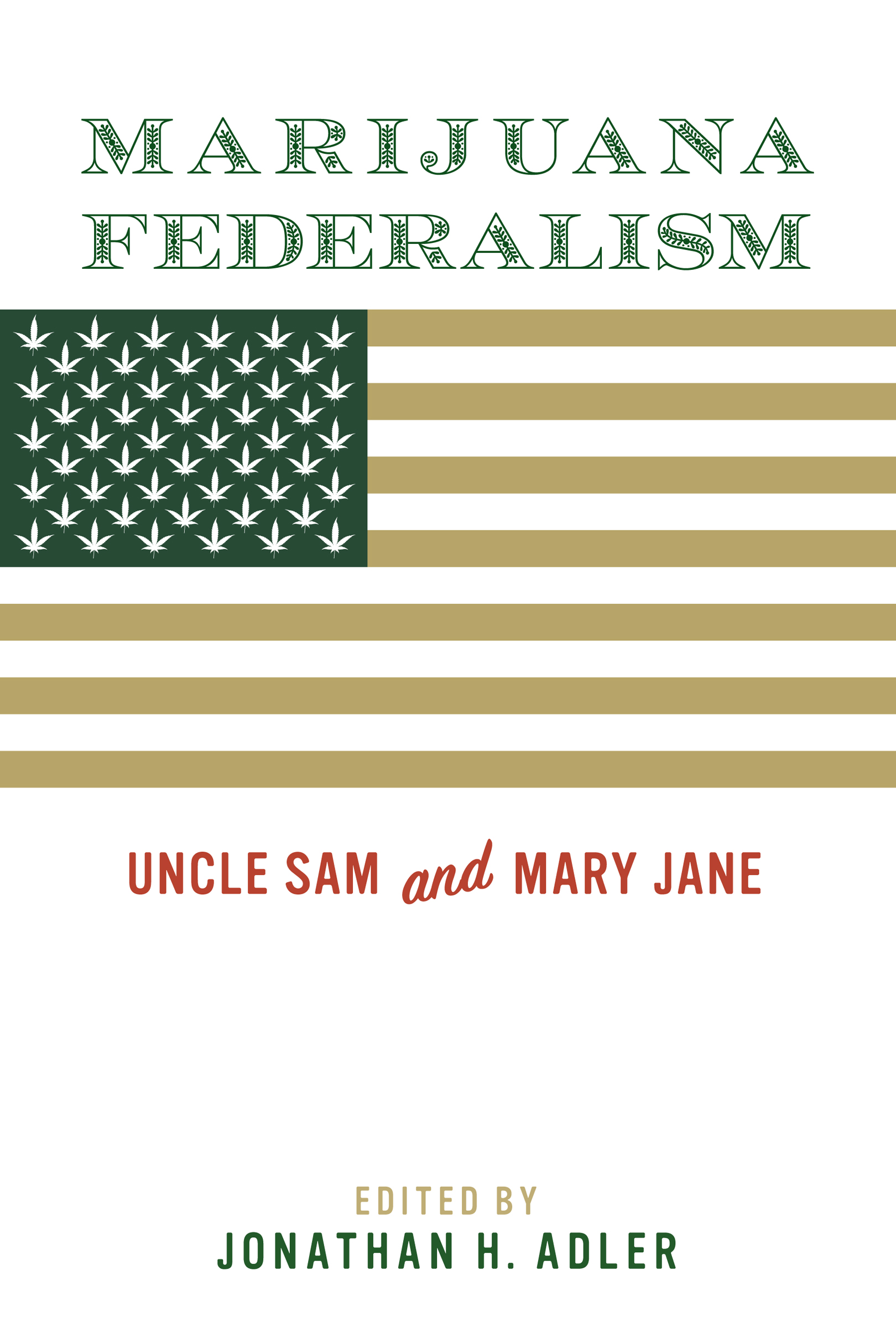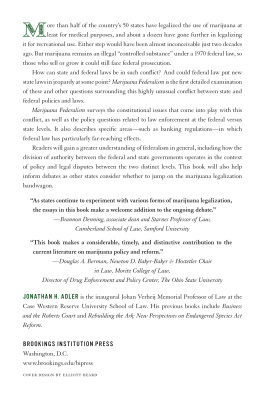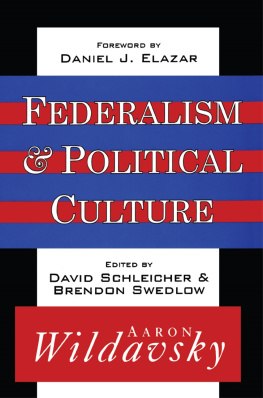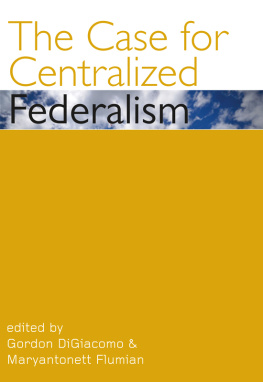Jonathan H. Adler - Marijuana Federalism: uncle sam and mary jane
Here you can read online Jonathan H. Adler - Marijuana Federalism: uncle sam and mary jane full text of the book (entire story) in english for free. Download pdf and epub, get meaning, cover and reviews about this ebook. publisher: Brookings Institution Press, genre: Politics. Description of the work, (preface) as well as reviews are available. Best literature library LitArk.com created for fans of good reading and offers a wide selection of genres:
Romance novel
Science fiction
Adventure
Detective
Science
History
Home and family
Prose
Art
Politics
Computer
Non-fiction
Religion
Business
Children
Humor
Choose a favorite category and find really read worthwhile books. Enjoy immersion in the world of imagination, feel the emotions of the characters or learn something new for yourself, make an fascinating discovery.
- Book:Marijuana Federalism: uncle sam and mary jane
- Author:
- Publisher:Brookings Institution Press
- Genre:
- Rating:3 / 5
- Favourites:Add to favourites
- Your mark:
- 60
- 1
- 2
- 3
- 4
- 5
Marijuana Federalism: uncle sam and mary jane: summary, description and annotation
We offer to read an annotation, description, summary or preface (depends on what the author of the book "Marijuana Federalism: uncle sam and mary jane" wrote himself). If you haven't found the necessary information about the book — write in the comments, we will try to find it.
Marijuana Federalism: uncle sam and mary jane — read online for free the complete book (whole text) full work
Below is the text of the book, divided by pages. System saving the place of the last page read, allows you to conveniently read the book "Marijuana Federalism: uncle sam and mary jane" online for free, without having to search again every time where you left off. Put a bookmark, and you can go to the page where you finished reading at any time.
Font size:
Interval:
Bookmark:

MARIJUANA FEDERALISM
Uncle Sam
Mary Jane
EDITED BY
JONATHAN H. ADLER
BROOKINGS INSTITUTION PRESS
Washington, D.C.
Copyright 2020
THE BROOKINGS INSTITUTION
1775 Massachusetts Avenue, N.W.
Washington, D.C. 20036
www.brookings.edu
All rights reserved. No part of this publication may be reproduced or transmitted in any form or by any means without permission in writing from the Brookings Institution Press.
The Brookings Institution is a private nonprofit organization devoted to research, education, and publication on important issues of domestic and foreign policy. Its principal purpose is to bring the highest quality independent research and analysis to bear on current and emerging policy problems. Interpretations or conclusions in Brookings publications should be understood to be solely those of the authors.
Library of Congress Cataloging-in-Publication data.
Names: Adler, Jonathan H., editor.
Title: Marijuana federalism : Uncle Sam and Mary Jane / edited by Jonathan H. Adler.
Description: Washington, D.C. : Brookings Institution Press, [2020] |
Identifiers: LCCN 2019048656 (print) | LCCN 2019048657 (ebook) | ISBN 9780815737896 (paperback) | ISBN 9780815737902 (epub)
Subjects: LCSH: Drug legalizationUnited States. | MarijuanaGovernment policyUnited States. | MarijuanaLaw and legislationUnited States. | Federal governmentUnited States. | Conflict of lawsUnited States.
Classification: LCC HV5825 .M354 2020 (print) | LCC HV5825 (ebook) | DDC 362.29/55610973dc23
LC record available at https://lccn.loc.gov/2019048656
LC ebook record available at https://lccn.loc.gov/2019048657
9 8 7 6 5 4 3 2 1
Typeset in Granjon LT
Composition by Elliott Beard
CONTENTS
Jonathan H. Adler
John Hudak | Christine Stenglein
Angela Dills | Sietse Goffard | Jeffrey Miron
Ernest A. Young
Robert A. Mikos
Zachary S. Price
Julie Andersen Hill
Cassandra Burke Robertson
William Baude
ACKNOWLEDGMENTS
This book grew out of a November 2014 conference at the Case Western Reserve University School of Law, the proceedings of which were published in the Case Western Reserve Law Review . That conference helped stimulate greater discussion of how the United Statess distinct federalist system should influence and shape the debate over marijuana policy reform. Thanks are due to those who helped make that program possibleboth those who have contributed to this volume directly and those who did not, including many people at the law school, not least of whom our co-deans, Jessica Berg and Michael Scharf. Special thanks are due to the late Peter Lewis, for the financial support that made the program possible, as well as to Graham Boyd.
In addition to the above, I would like to thank Joseph Sabo and Lisa Peters for their research assistance, Bill Finan at the Brookings Institution Press for believing this project was worthwhile, Cecilia Gonzlez for overseeing production at the press, and all of those (not least of whom my family) who have had to put up with me while I was completing this and other projects.
Introduction
OUR FEDERALISM ON DRUGS
Jonathan H. Adler
Just twenty-five years ago, marijuana was illegal throughout the United States. Beginning in the 1990s, several states, led by California, began to allow the cultivation, possession, and use of cannabis for medicinal purposes, but they remained the exception. In the past decade, however, the legal landscape for marijuana has been radically transformed as an increasing number of states have rejected marijuana prohibition.
Colorado and Washington were the first states to withdraw fully from the federal war against marijuana. In 2012, voters in both states approved ballot initiatives legalizing possession of marijuana for recreational use and authorizing state regulation of marijuana production and commercial sale. while another dozen states largely decriminalized personal possession of small amounts of marijuana. By 2019, only a handful of states had failed to loosen legal restrictions on marijuana in some way.
These rapid changes in state marijuana policy both exploit and challenge American federalism. While many states have rejected marijuana prohibition, the use, possession, cultivation, and sale of marijuana remain illegal under federal law. Some also fear that the legalization of marijuana sales in some jurisdictions could feed the black market in other states.
The constitutional authority of the federal government to prohibit the possession and distribution of marijuana was affirmed by the Supreme Court, but the ability of the federal government to enforce this policy on the ground is largely dependent on state cooperation. The federal government is not responsible for the local cop on the beat, and federal law enforcement agencies have neither the resources nor the inclination to try to enforce the federal marijuana prohibition nationwide.
While the federal government has not prioritized enforcement of marijuana prohibition in states that have adopted more permissive marijuana policies, it has not sought to preempt state initiatives either, including those that affirmatively license and regulate a growing marijuana industry. Congress, for its part, has made clear that it does not want federal law enforcement efforts to interfere with state-level medical marijuana programs. While failing to enact legislation to authorize or decriminalize medical marijuana where permissible under state law, Congress has repeatedly prohibited federal law enforcement agencies from taking actions that could prevent states from implementing their own medical marijuana programs. As interpreted by federal courts, these appropriations riders bar the federal prosecution of individuals for conduct that is expressly permitted by state medical marijuana laws. This is not a permanent condition, however, as appropriations riders must be reenacted each year to remain effective.
Even before Congress limited federal enforcement efforts, state and local law enforcement agencies were responsible for the overwhelming majority of marijuana law enforcement. Whatever course federal policy takes, this is unlikely to change. There are approximately four times as many state and local law enforcement officers within just two statesWashington and Coloradoas there are Drug Enforcement Administration (DEA) agents across the globe. If state and local governments do not cooperate, the federal government must wage its war on drugs without many foot soldiers.
For the most part, federal agencies have not shown much interest in interfering with state-level reforms. In a series of memoranda issued during the Obama administration, the Department of Justice (DOJ) sought to clarify federal enforcement priorities, deemphasizing federal enforcement in states where marijuana possession is legal for some or all purposes. In 2009, Deputy Attorney General David Ogden issued a memorandum indicating that the Justice Department would focus its enforcement efforts on the production and distribution of marijuana in an effort to curb trafficking, but would not devote significant resources to pursue those who used or possessed marijuana in compliance with state laws allowing the use and possession of marijuana for medicinal purposes.
After Colorado and Washington voters passed their respective marijuana legalization initiatives, the Justice Department maintained this position. In August 2013, Deputy Attorney General Cole announced that the department would make no effort to block the implementation of either initiative, nor was it the federal governments position that state-level regulations of marijuana were preempted by the CSA.
Font size:
Interval:
Bookmark:
Similar books «Marijuana Federalism: uncle sam and mary jane»
Look at similar books to Marijuana Federalism: uncle sam and mary jane. We have selected literature similar in name and meaning in the hope of providing readers with more options to find new, interesting, not yet read works.
Discussion, reviews of the book Marijuana Federalism: uncle sam and mary jane and just readers' own opinions. Leave your comments, write what you think about the work, its meaning or the main characters. Specify what exactly you liked and what you didn't like, and why you think so.










